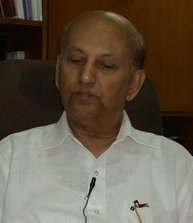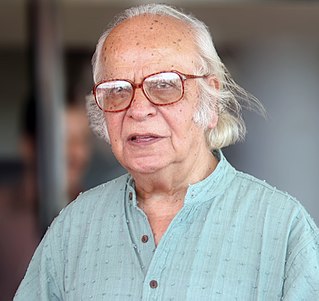Related Research Articles

Ashoke Sen, FRS is an Indian theoretical physicist and distinguished professor at the Harish-Chandra Research Institute, Allahabad. He is also an honorary fellow in National Institute of Science Education and Research (NISER), Bhubaneswar, India and also a Morningstar Visiting professor at MIT and a distinguished professor at the Korea Institute for Advanced Study. His main area of work is string theory. He was among the first recipients of the Fundamental Physics Prize "for opening the path to the realisation that all string theories are different limits of the same underlying theory".

Udupi Ramachandra Rao was an Indian space scientist and chairman of the Indian Space Research Organisation. He was also the Chairman of the Governing Council of the Physical Research Laboratory at Ahmedabad and Nehru Planetarium at Bengaluru and chancellor of the Indian Institute for Space Science and Technology (IIST) at Thiruvananthapuram.
Sankar Kumar Pal is a Distinguished Scientist and former Director of the Indian Statistical Institute, Kolkata, India. He is a computer scientist with an international reputation on fuzzy neural network, soft computing, and machine intelligence. He founded the Machine Intelligence Unit in 1993, and the Center for Soft Computing Research: A National Facility in 2004, both at the ISI. He is the founder President of the Indian National Academy of Engineering, Kolkata Chapter.

C.S. Seshadri FRS is an eminent Indian mathematician. He is the founder and Director-Emeritus of the Chennai Mathematical Institute, and is known for his work in algebraic geometry. The Seshadri constant is named after him.

Yash Pal was an Indian scientist, educator and educationist. He was known for his contributions to the study of cosmic rays, as well as for being an institution-builder. In his later years, he became one of the leading science communicators of the country.
Satya Atluri is a world-renowned Indian-American engineer, educator, researcher and scientist in aerospace engineering, mechanical engineering and computational sciences, who is currently the Presidential Chair & University Distinguished Professor at Texas Tech University.
Ajit Ram Verma (1921-2009) was an Indian physicist. For his work in crystallography, he was awarded the Shanti Swarup Bhatnagar Prize in 1964. He was Director of the National Physical Laboratory (NPL) for almost seventeen years (1965-1982). In 1982, the Padma Bhushan, India's third highest civilian award, was conferred on him by the President of India.
Suhas Pandurang Sukhatme is an Indian scientist, teacher, author and a former Chairman of the Atomic Energy Regulatory Board of the Government of India, known for his expertise in heat transfer and energy technologies. He was honoured by the Government of India, in 2001, with the fourth highest Indian civilian award of Padma Shri.
Paranandi Venkata Suryanarayana Rao is an Indian computer scientist, known for his researches in the fields of speech and script recognition and is credited with contributions for the development of TIFRAC, the first indigenously developed electronic computer in India. He is a recipient of awards such as IEEE Third Millenium Medal, Vikram Sarabhai Award, Om Prakash Bhasin Award and VASVIK Industrial Research Award. The Government of India awarded him the fourth highest civilian honour of Padma Shri in 1987.
Asis Datta is an Indian biochemist, molecular biologist and genetic engineer, known for his research on genetically modified foods and food nutritional security. He was the founding Director of the National Institute of Plant Genome Research and is credited with the discovery of genes that assist in extended preservation of fruits and vegetables. He is a recipient of the Shanti Swarup Bhatnagar Award, the highest Indian award and in the Science category, and was awarded the fourth highest civilian award of the Padma Shri, by the Government of India, in 1999. In 2008, he was included again in the Republic Day Honours list for the third highest civilian honour of the Padma Bhushan.
Vishweshwaraiah Prakash is an Indian structural biologist, food technologist and a former director-general designate of the Council of Scientific and Industrial Research (CSIR). He is a former director of the Central Food Technological Research Institute (CFTRI), Mysore and was involved with the International Union of Food Science and Technology as the chairman of its International Academy during 2008-10. He received the Shanti Swarup Bhatnagar Prize, the highest Indian award in the science and technology category in 1996. The Government of India awarded him the fourth highest civilian honour of the Padma Shri in 2004,

Ranbir Chander Sobti is an Indian educationist, cell biologist. He is a former vice chancellor of the Panjab University, Chandigarh and Babasaheb Bhimrao Ambedkar University, Lucknow. He is known to have involved in advanced research in plant genetic studies and has written over 240 articles, and 22 books including Essentials of Biotechnology and Emerging Trends in Biomedical Science and Health. He is an elected Fellow of several major science academies such as Indian National Science Academy, National Academy of Agricultural Sciences, National Academy of Medical Sciences, National Academy of Sciences, India, and Punjab Academy of Sciences. The Government of India awarded him the fourth highest civilian honour of the Padma Shri, in 2009, for his contributions to Literature and Education.
Khushwant Lal Wig (1904–1986) was an Indian physician, medical academic, writer and the director of the All India Institute of Medical Science, New Delhi. He was a Fellow of the Royal College of Physicians of London and a recipient of Dr. B. C. Roy Award, the highest Indian award in the medical category. The Government of India awarded him the third highest civilian honour of the Padma Bhushan, in 1964, for his contributions to the Medical science.

Vaidyeswaran Rajaraman is an Indian engineer, academic and writer, known for his pioneering efforts in the field of Computer Science education in India. He is credited with the establishment of the first academic programme in computer science in India, which he helped initiate at the Indian Institute of Technology, Kanpur in 1965. An elected fellow of all the Indian science academies, he is a recipient of Shanti Swarup Bhatnagar Prize, the highest Indian award in Science and Technology category for young scientists and several other honors including Om Prakash Bhasin Award and Homi Bhabha Prize. The Government of India awarded him the third highest civilian honour of the Padma Bhushan, in 1998, for his contributions to science.

Dipankar Chatterji is an Indian molecular biologist and the Honorary Professor at Molecular Biophysics Unit, Indian Institute of Science, a multidisciplinary research institute under the Department of Science and Technology of the Government of India. He is known for his pioneering research on bacterial transcription. He is a recipient of Shanti Swarup Bhatnagar Prize and is an elected fellow of all the major Indian science academies. The Government of India awarded him the fourth highest civilian honour of the Padma Shri, in 2016, for his contributions to science and engineering.

Kasturi Lal Chopra is an Indian material physicist and a former director of the Indian Institute of Technology, Kharagpur. He is the founder of the Thin Film Laboratory at Indian Institute of Technology, Delhi and the Microscience Laboratory at IIT, Kharagpur and holds several US and Indian patents for his research findings. Author of a number of books on thin film technology, Chopra is a recipient of Shanti Swarup Bhatnagar Prize, the highest Indian award in the science and technology categories. The Government of India awarded him the fourth highest civilian honour of the Padma Shri, in 2008, for his contributions to science and engineering.
Satinder Vir Kessar is an Indian synthetic organic chemist, academic and an Emeritus professor of Panjab University. He is known for his researches in steroidal and heterocyclic chemistry. He is an elected fellow of The World Academy of Sciences and all the three major Indian science academies, viz. The Indian National Science Academy, the Indian Academy of Sciences and the National Academy of Sciences, India. The Council of Scientific and Industrial Research, the apex agency of the Government of India for scientific research, awarded him the Shanti Swarup Bhatnagar Prize for Science and Technology, one of the highest Indian science awards, in 1972, for his contributions to chemical sciences.
Rajinder Kumar is an Indian chemical engineer and a former professor at the Indian Institute of Science. He is known for his studies on multiphase phenomena and is an elected fellow of the Indian National Science Academy, Indian Academy of Sciences, and the Indian National Academy of Engineering. The Council of Scientific and Industrial Research, the apex agency of the Government of India for scientific research, awarded him the Shanti Swarup Bhatnagar Prize for Science and Technology, one of the highest Indian science awards for his contributions to Engineering Sciences in 1976. He received the third highest Indian civilian award of the Padma Bhushan in 2003. He is also a recipient of Om Prakash Bhasin Award and the VASVIK Industrial Research Award.
Narendra Kumar was an Indian theoretical physicist and a Homi Bhaba Distinguished Professor of the Department of Atomic Energy at Raman Research Institute. He was also an honorary professor at Jawaharlal Nehru Centre for Advanced Scientific Research.

Shiv Ram Kashyap was a botanist in British India. He was a specialist on the bryophytes especially from the Himalayan region. He has been called the father of Indian bryology.
References
- 1 2 Fellow profile, Indian Academy of Sciences, retrieved 2013-03-14.
- 1 2 3 4 5 6 7 8 9 10 Fellow profile Archived 15 April 2013 at Archive.today , Indian National Science Academy, retrieved 2013-03-14.
- ↑ Ram Prakash Bambah at the Mathematics Genealogy Project
- ↑ "Padma Awards" (PDF). Ministry of Home Affairs, Government of India. 2015. Retrieved 21 July 2015.